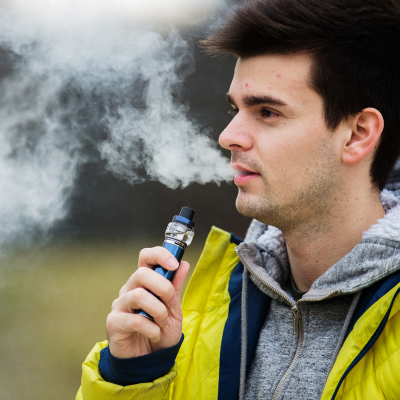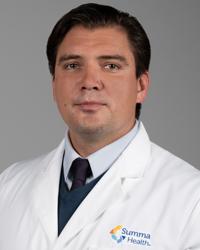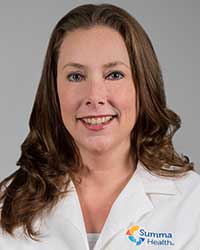Smoking Cessation: Evidence-Based Insights on Common NRT, New FDA Approved Zyn Nicotine Pouches vs. Vaping [Podcast]
Posted November 11, 2025

Featured Speakers:
Aliaksandr Ramaniuk, DO
Nicole Piriak, BS, RRT, CTTS
Scott Webb (Host): Quitting smoking is likely one of the hardest things to do. And my guests are here today to discuss the many health benefits to quitting, replacement therapies, and how the team at Summa Health can help with smoking cessation. And I'm joined today by Dr. Aliaksandr Ramaniuk. He's a pulmonary and critical care physician. And I'm also joined by Nicole Piriak. She's a smoking cessation program coordinator. And they're both with Summa Health.
This is Healthy Vitals, a podcast from Summa Health. I'm Scott Webb. It's nice to have you both here today. We're going to talk about smoking cessation, some of the challenges, benefits, options, all that good stuff. So doctor, I'm going to start with you and just ask you, you know, like what are the challenges with quitting smoking? Maybe the signs and symptoms folks will experience, and definitely what are some of the benefits that folks can get from quitting?
What are the benefits to quitting smoking?
Dr. Aliaksandr Ramaniuk: We recognize as healthcare providers that quitting smoking is one of the most challenging things that you may be having to do in your daily life. It impacts so many organ systems. It impacts so many factors in your life. And these habits that we develop over years definitely have an impact once we work towards cessation. But hopefully, with this podcast and this conversation, we can give you some tools to discuss how to quit smoking effectively and how we can manage these symptoms. We recognize that smoking has not only an impact on your lungs, but it has systemic manifestations.
When you smoke, we understand that it, sometimes it's related to anxiety, distress, habit. Smoking has impacts on the brain regarding your alertness and mood. It has an impact on your gastrointestinal systems and your vascular systems. But we do know over years of medical research, that smoking overall has a dramatic increase to your risk factors and mortality and morbidity from cardiovascular disease, from lung diseases. And there is an effort to help the people listening and the people in our community to work towards stopping smoking while recognizing that your medical team is here for you. And we recognize the difficulty of this challenge.
Host: Doctor, is there a right way "to quit smoking'? And maybe what are some of the strategies as folks get to that point where it's time to quit, they really believe it, they know it, they have to do it. What are some strategies?
What is the best way to quit smoking?
Dr. Aliaksandr Ramaniuk: From my perspective, the approach, the phase where you decide that you will give up smoking is a difficult phase, and you have to be committed. Your family members and your community has to be committed around your smoking cessation. Oftentimes, patients have difficulty quitting smoking when their significant other or spouse or somebody in the family members or their environment triggers them to smoking.
Luckily, in the last couple years, we have several ways where we can effectively with evidence based help you quit smoking with pharmacological medicines, nicotine replacement therapies, and other modalities to replace the nicotine system. So, the withdrawal from nicotine, which we talked about impacts so many organ systems, can be done safely and slowly. You don't have to work on quitting right away and stop at the same time. Some people quit cold Turkey. But for some, it takes a longer process and the goal is for you to be motivated and to work with the team because we do know that when we do quit smoking and we have underlying heart lung disease, more therapy options open up to us and we'll talk about that a little bit later. But when we have some potential and then there's a reason and there's a motivation, and there's a support network behind you, that's when we can be successful in quitting smoking.
Host: Yeah. Nicole, I wanted to bring you in and talk about some of those additional therapy options that doctor mentioned there. Some folks, it may be vaping, lozenges, gum, pouches, patches, you know, all those types of things. But just in general, broadly, like when we think about the therapy options, what are they, how do we know which is the right one for us? And are things like asthma and COPD also a factor in that decision?
What are some nicotine replacement therapies?
Nicole Piriak: Yes, they could be. And there are a lot of options. You know, it can be overwhelming to a lot of patients. So, there are nicotine replacement therapies such as patches, lozenges, and gum. We have non-nicotine medications to help with cessation as well, and that is something that the patient should follow up with their provider and see kind of what is beneficial to them to use for their quit process. You can also go ahead and try to quit smoking without using any nicotine replacement therapies or medications. I know there's a lot of patients that really are reluctant to use anything. And, you know, a lot of times, I'll tell them that's okay. But, you know, we still try to come up with a quit plan that works for them, that they can fit into their lifestyle. It all really does depend on how ready they are to quit and how motivated they are to quit like Dr. Ramaniuk said.
Host: Yeah. Yeah, that makes sense to me. And I've heard that before. It's like folks really have to be ready, right, Doctor? And it makes me wonder, I was asking Nicole there, but maybe you can jump in here, folks who are smokers, but also have asthma and COPD, some of these other comorbidities or medical complications, whatever the right way is to put that. What's your perspective on that and quitting smoking in some of the therapies?
Dr. Aliaksandr Ramaniuk: We see this almost every day. Our patients suffer from their underlying respiratory conditions, which are exacerbated by smoking. Sometimes we put a lot of medications that themselves have side effects that are costly for asthma, COPD, and we have very good therapies. But like I tell my patients, you know, I don't want to get a really good Band-Aid for you when we're hitting ourselves with an injury or hitting ourselves in the knee with a hammer, a good Band-Aid or a good coverage is not sufficient, really stopping the injury process, rather than focusing on therapies alone.
But furthermore, when we do quit smoking and we have underlying obstructive lung disease like COPD, in the right patient population, this opens up to a lot of additional therapies. This opens up to us for COPD patients with a specific type, they can get interventions like bronchoscopic lung volume reduction, which we do here at Summa with Dr. Ford and the Dr. Bauman's team. We have advanced biologics so we can advance your therapies, but the first step is to remove that injury that's happening daily basis.
Host: I see what you mean, right? The important thing is the smoking cessation, the quitting smoking. I wanted to bring you back, Nicole, and talk more about e-cigarettes. I feel like, and maybe this is just anecdotal, but I feel like a lot of folks figure, "Well, I'm going to quit smoking, so it's natural to switch to e-cigarettes." And I just want to get your perspective as an expert on this. Is that the right way to go for folks or do you not recommend that?
Are e-cigarettes a good way to quit smoking?
Nicole Piriak: Using an electronic cigarette typically is not a approved method for cessation. Main reason is we still don't know a lot of the long-term health effects e-cigarettes. They do contain nicotine, which is highly addictive. Using them as a smoking cessation tool usually results in replacing one addiction for another.
Also, most vaping products are not regulated by the FDA. We've also seen tests that have been done, that have found over 2000 chemicals in these products. And what I've noticed with some of our patient population here, if they already have an underlying health condition or a lung disease like asthma, emphysema, COPD, most patients will tell me when they do try to use a vaping product that it just takes their breath away. They feel short of breath, they cough a lot. So, I really try to steer patients away from using electronic cigarettes for cessation.
Host: Yeah, I see what you mean. It's like replacing one addiction with another one that may actually bring more health risks. And that's what I wanted to ask you about, Nicole, is like, can you give us a sense of some of the health risks as far as we know so far associated with vaping?
What are the health risks associated with vaping?
Nicole Piriak: Sure. Vaping has been linked to several potential health risks. We know vaping can definitely irritate the lungs, and it leads to symptoms of coughing, wheezing, and shortness of breath, and it can increase lung infections. Popcorn lung is also a concern. It's a serious health condition. It's caused mainly by the chemicals and flavored vape juices. The condition does damage the small airways in the lungs, and it can cause scar tissue and permanent lung damage. There are also other risks not just related to the lungs. We know vaping can increase cardiovascular risk, cancer risk, behavioral health disorders, and it can cause oral health problems, and that's just to name a few.
Host: Right. Just to name a few. I wanted to bring you back. Doctor, from your perspective? It just seems natural to folks, "Well, if I want to quit smoking, I have to do something. So, I'll try e-cigarettes and vaping and all of that." What's your perspective medically speaking on some of these replacement therapies, if you will?
Dr. Aliaksandr Ramaniuk: Right now, we do know over years of history and medical literature that smoking cigarettes has a tremendously detrimental, very bad outcome on your lungs. It causes significant risk of lung cancer, of smoking-related lung diseases progressing, and everybody's going to have different tolerance. Some people can smoke for a long time or their lungs get completely destroyed. And some people may be a little bit more salvaged, but eventually are still at an increased risk. We don't have an ideal nicotine replacement product. The gums and the lozenges are certainly beneficial. There's medicines like Chantix that also may facilitate smoking cessation. There's various antidepressant type of medications that also decrease the craving. The vaping is a new graze that recently was implemented and really, unfortunately, was targeted towards our younger population, and we don't want the youth of our nation hooked on smoking and vaping and changing one habit for another challenging habit.
Also, in the recent literature, there's all these new pouches and other things that are often sold to our patient population. Overall, I would say from just clinical experience, we do know that predominantly the highest risk for lung cancer and for lung diseases is from smoking cigarettes. The other replacement vaping products, certainly another tobacco based products have an associated risk factor as well. If we can replace that addiction with FDA-approved nicotine replacement salts, so there's a difference between tobacco, which is believed that is associated with chemicals and carcinogens and nicotine salt, that may be a safer option like they do with the nicotine replacement therapies you can find at your local pharmacy.
Host: FDA approved. Right. I wanted to ask you, Nicole, nicotine-free vaping, Is that a thing? I think I heard that, maybe I'm just imagining it. Is that a thing?
What is nicotine-free vaping?
Nicole Piriak: It is. And while using the nicotine-free vapes, they may be less harmful than vaping with nicotine. It is still not completely safe. It doesn't go without its challenges. Most of vaping products that do claim to be nicotine-free, we've found studies that still show that they still have nicotine in them. Some studies still show that nicotine can have three to four times the percent of the amount of nicotine compared to what they are advertising that they do have. Besides that, there are still a lot of other chemicals in these products that are unsafe. There's a lot of heavy metals, arsenic, formaldehyde, just to name a few. All of these have been linked to lung disease and cancers throughout the body, and also different cardiovascular issues. So, inhaling any kind of vapor can irritate the lungs and cause respiratory problems, and a lot of times those can be irreversible.
Host: Right. And I'm going to give last word to you, Doctor, when we try to help folks to quit smoking, you know, smoking cessation is the goal here, right? Because there's just so many health benefits. What are your final thoughts and takeaways?
What is your best advice to quit smoking?
Dr. Aliaksandr Ramaniuk: My final thoughts are this is smoking cessation is extremely difficult. It requires social support motivation and resources at Summa Health. We recognize that, and that is why with our pulmonary department and our medicine department, our focus is to help you with smoking cessation through a designated team, not just your physicians and nurse practitioners and nursing. But at Summa Health, we're unique where we have Nicole and the Smoking Cessation Clinic that does a lot of the difficult work for you where we can follow up, track, answer questions, and explain the feelings that you are feeling as you're working towards quitting smoking. That is what we're offering here for you, and we're here and we're dedicated here at Summa Health with our smoking cessation clinic and the help of Nicole Piriak and our team to help our community quit smoking.
Host: Yeah, that's perfect, and I really appreciate your time today. As you say, it's very difficult. Maybe the most challenging thing for folks, you know, one of the most challenging things for folks to do in their lifetime is to quit smoking. But so many physical benefits, psychological benefits, so much good can come from quitting. And as you say, working at Summa Health, working with Nicole and the team, all good stuff. So, thank you both.
Dr. Aliaksandr Ramaniuk: Thank you.
Nicole Piriak: Thank you.
Host: And to learn more, go to summahealth.org/smokingcessation. And if you enjoyed this episode of Healthy Vitals, we'd love it if you'd leave us a review. Your review helps others find our educational content. I'm Scott Webb. Thanks for listening, and we'll talk again next time.
Vitality eNews Sign Up
Receive the Summa Health eNewsletter for the latest health tips, advice and updates.


